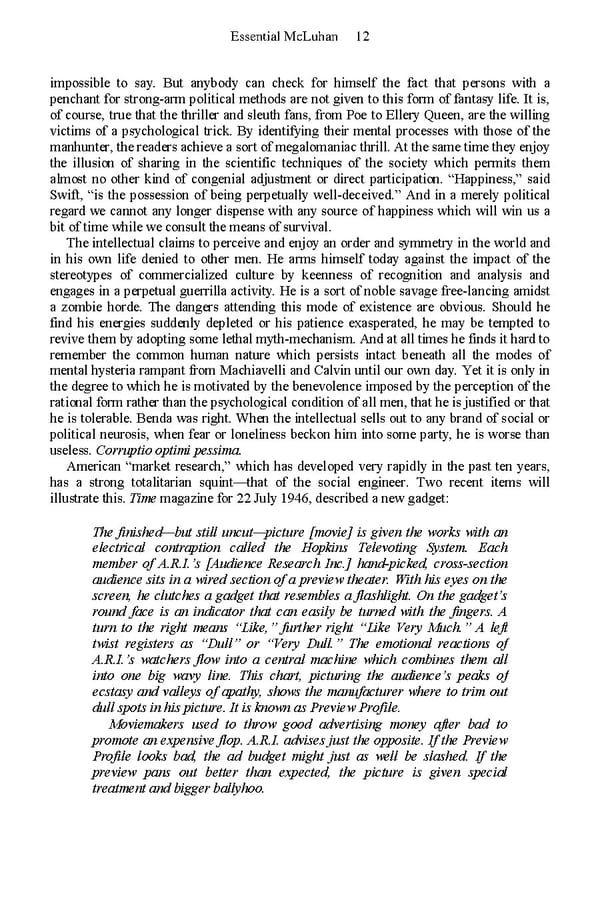Essential McLuhan 12 impossible to say. But anybody can check for himself the fact that persons with a penchant for strong-arm political methods are not given to this form of fantasy life. It is, of course, true that the thriller and sleuth fans, from Poe to Ellery Queen, are the willing victims of a psychological trick. By identifying their mental processes with those of the manhunter, the readers achieve a sort of megalomaniac thrill. At the same time they enjoy the illusion of sharing in the scientific techniques of the society which permits them almost no other kind of congenial adjustment or direct participation. “Happiness,” said Swift, “is the possession of being perpetually well-deceived.” And in a merely political regard we cannot any longer dispense with any source of happiness which will win us a bit of time while we consult the means of survival. The intellectual claims to perceive and enjoy an order and symmetry in the world and in his own life denied to other men. He arms himself today against the impact of the stereotypes of commercialized culture by keenness of recognition and analysis and engages in a perpetual guerrilla activity. He is a sort of noble savage free-lancing amidst a zombie horde. The dangers attending this mode of existence are obvious. Should he find his energies suddenly depleted or his patience exasperated, he may be tempted to revive them by adopting some lethal myth-mechanism. And at all times he finds it hard to remember the common human nature which persists intact beneath all the modes of mental hysteria rampant from Machiavelli and Calvin until our own day. Yet it is only in the degree to which he is motivated by the benevolence imposed by the perception of the rational form rather than the psychological condition of all men, that he is justified or that he is tolerable. Benda was right. When the intellectual sells out to any brand of social or political neurosis, when fear or loneliness beckon him into some party, he is worse than useless. Corruptio optimi pessima. American “market research,” which has developed very rapidly in the past ten years, has a strong totalitarian squint—that of the social engineer. Two recent items will illustrate this. Time magazine for 22 July 1946, described a new gadget: The finished—but still uncut—picture [movie] is given the works with an electrical contraption called the Hopkins Televoting System. Each member of A.R.I.’s [Audience Research Inc.] hand-picked, cross-section audience sits in a wired section of a preview theater. With his eyes on the screen, he clutches a gadget that resembles a flashlight. On the gadget’s round face is an indicator that can easily be turned with the fingers. A turn to the right means “Like,” further right “Like Very Much.” A left twist registers as “Dull” or “Very Dull.” The emotional reactions of A.R.I.’s watchers flow into a central machine which combines them all into one big wavy line. This chart, picturing the audience’s peaks of ecstasy and valleys of apathy, shows the manufacturer where to trim out dull spots in his picture. It is known as Preview Profile. Moviemakers used to throw good advertising money after bad to promote an expensive flop. A.R.I. advises just the opposite. If the Preview Profile looks bad, the ad budget might just as well be slashed. If the preview pans out better than expected, the picture is given special treatment and bigger ballyhoo.
 Essential McLuhan Page 18 Page 20
Essential McLuhan Page 18 Page 20